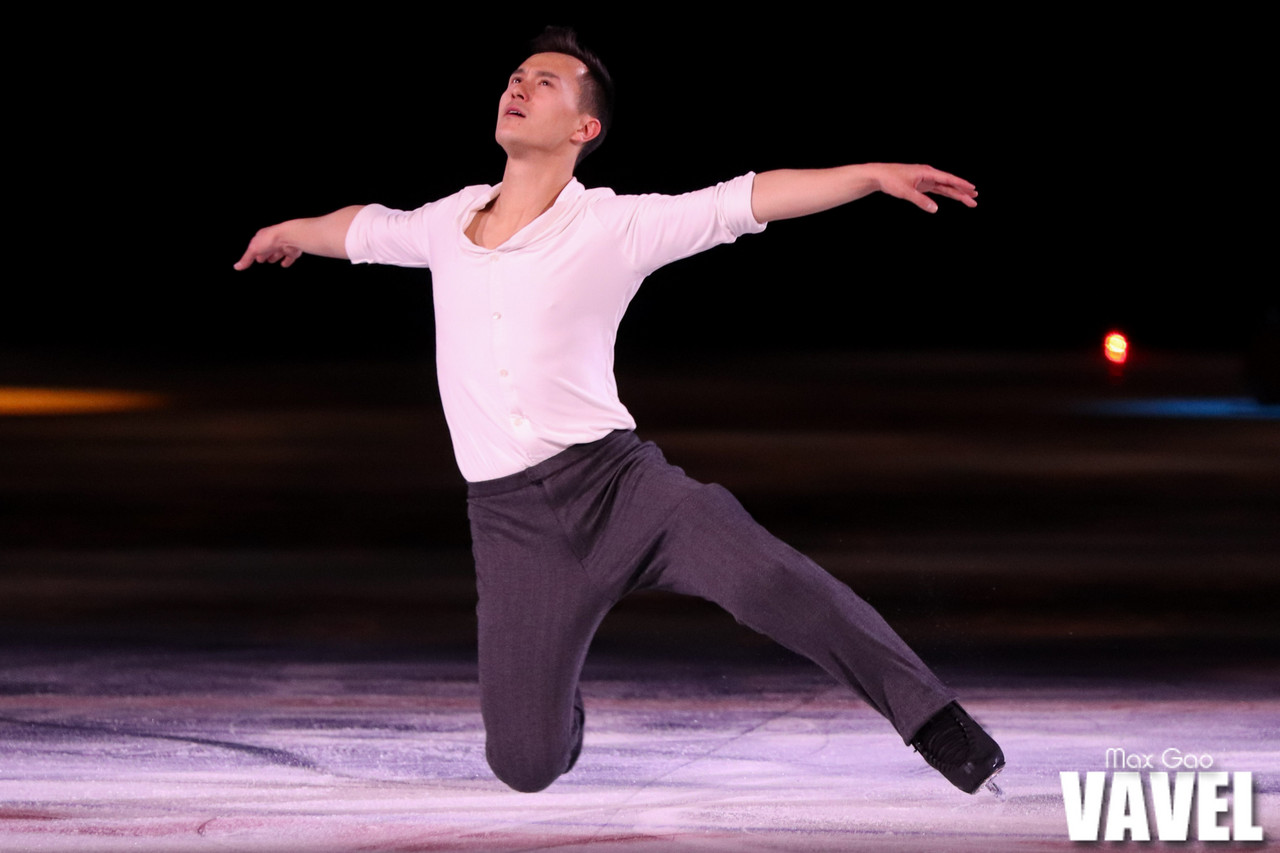It was a frigid Monday morning in the middle of last April when Patrick Chan stepped to the main podium at the CBC Studios in Toronto, ready to officially announce his retirement from competitive figure skating to the media.
To say it had been a very emotional last four months for Chan would be a gross understatement.
After winning an unprecedented 10th title at the Canadian Tire National Skating Championships, the three-time World champion travelled to South Korea to compete in his third and final Winter Olympic Games. Knowing full well that his four skates in PyeongChang would be the last of his illustrious competitive career, Chan was in search of the one thing that had eluded him for his entire senior career: an Olympic gold medal. After placing fifth at his first Olympics in Vancouver and winning two silver medals four years later in Sochi, the Canadian took a year off from competition before returning in late 2015, with his sights set firmly on one last eventual shot at Olympic glory.
Despite some understandable nerves in the team event, the three-time World champion was able to produce two solid performances to give the Canadians a sizeable advantage over the Russians, and some career-best performances on Olympic ice from his compatriots were enough to secure the historic win for Canada. Despite a ninth-place finish in the individual event to bookend his competitive career, Chan was returning home with his teammates with his head held high — and with a gold medal around his neck. He would officially announce his retirement just weeks later.
“For an athlete’s competitive journey, Olympic gold seems to be the only ultimate prize in amateur sports. Some say it’s the definition of success and a chance to be someone, like Willy Wonka’s golden ticket, but at the end of the day, you make it what you want,” Chan said in his emotional 10-minute retirement announcement, where he thanked numerous people who had all played a role in his competitive career. “Seeing my parents smiling in the stands and cheering loud at my last Olympic Games was my golden ticket. They were there before I dreamed of winning, and they’re still here with the same smile that I recognize from day one.”
“It has been an honour and a privilege to skate for Canada. It has given me memorable experiences and has taught me lessons I will carry throughout life. I have fulfilled my dreams and aspirations in competitive skating and it is now time to move on to new challenges and opportunities,” said the 10-time National champion in another statement released by Skate Canada.
A year on from that moving retirement ceremony, Chan has been keeping busy both on and off the ice, while enjoying the perks of being able to say that he became a retiree at the age of 27 (which, he says, makes a lot of people chuckle). As one of the biggest stars on this year’s Stars on Ice tour, the now-28-year-old Canadian is about to complete yet another nationwide tour, having completed two big ones after retiring last year.
In between a quick dinner with the rest of the cast and the start of the show in Hamilton, a relaxed Chan graciously took the time to do an exclusive sit-down interview, where he openly discussed everything from his challenging first 12 months after retirement to his plans for the foreseeable future, which could include a return to the world of competitive skating in a very different capacity.
Max: Alright, Patrick, thank you so much for taking the time to do this. First of all, how are things going? I know you’ve been skating in shows, doing commentating and some other small things ever since you retired, but how have things been going lately?
Patrick: Yeah, I’m trying to put my hand in multiple jars… (smiles). It’s been an interesting one year after retirement, but I definitely don’t regret my decision and I feel like my mind and my body was ready to move on. I did some commentating at the Grand Prix Final in Vancouver — ’cause it was in my hometown, or [rather] where I live now — so it was an easy experience. It wasn’t for any financial reasons; it’s mostly about just absorbing as much information as I can in different careers. [I’ve been] doing a lot of seminars and shows locally in B.C., tours — of course! We did The Thank You Canada Tour [last fall] and also Stars on Ice.
M: Between all the shows and different careers that you’re involving yourself in now, do you ever miss competing? When you’re surrounded by that kind of environment, is it a relief to be away from all of that now or do you occasionally still feel a desire to get back on the ice and compete from time-to-time?
P: A little bit. I would be lying if I said no, I think, and that’ll forever be a little feeling that I’ll always have. I feel it more so when I’m at home, watching the World Championships on TV and seeing what they’re doing now. It makes you hungry to compete because you watch it with a critical eye and you think, ‘I could have done that better.’ But then there’s just things that I really can’t — the jumps that they’re doing these days — I just would not be able to compete with that.
M: Now that you’ve tried a little bit of producing for The Thank You Canada Tour, can you tell me a little bit about what that experience was like for you?
P: It was different. I mean, it can be stressful because you look at the tour as kind of Mount Everest and you’re just like, ‘Oh, my God. How am I gonna — ?’ (laughs). There’s just so many steps to get there and luckily, I wasn’t leading the march. It was more Tessa [Virtue] and Scott [Moir] that were leading it and the producers. I was just more kind of like the commentating [at the Grand Prix Final] — just soaking it in and just understanding how it works and how to kind of do business with Tessa and Scott.
Also just getting involved on a deeper level in the skating world, the show world. It was very interesting, but I really find it fascinating and I’m still developing my own skills in terms of artistically and creatively. I’m still exploring that and I actually feel like that part of my being is growing as the months go by after my competitive career ’cause I have the liberty to really think outside the box and not feel like I’m so focused on the next competition, the next jump that I have to land, the next technical thing that I have to acquire.
.jpg)
M: For sure. I know you’ve also expressed an interest in opening your own skating school or academy. Is that still in the works?
P: I mean, there was a rumour going around that I was opening a school in Vancouver and I was in talks with a developer three, four years ago. Luckily, that fell through. I’m saying luckily because it’s just that you have to be very careful with who you get into business with and something that big — it’s big money, a lot of money… You’re talking millions and millions of dollars to build a rink, so maybe I jumped the gun a bit in terms of announcing it to people. I say it’s more like a dream now, and I’m now exploring my path to maybe get to that skating school. It’s maybe a longer path, but at this point, I’m not even ready to do my own school. Honestly, it wouldn’t be fair to the skaters that come to the school, to the academy. It wouldn’t be fair because I would be there very little, so it wouldn’t really make sense.
M: So as someone who has long been known or considered as the golden standard when it comes to artistry, do you ever see yourself returning to figure skating as a choreographer instead of a coach then? Obviously, coaching is one thing but choreography is a very different thing for a lot of people.
P: Yeah, right now, I don’t have the confidence to be a choreographer. I’m still, like I said, exploring the creative side of me and I’m starting to be a little more comfortable with myself in terms of expression and interpreting music. I never really saw myself as a very artistic person.
M: Oh, really?
P: No, not really (laughs). I love being told what to do and maybe putting my spin on it, but the base layer of choreography is done already. I’m not the one coming up with it; I’m the one who’s executing it and I really enjoy that part — I still do. Whereas maybe a Jeff Buttle, who’s demonstrated a talent for choreography, I think, early on. My path wasn’t as clear… I’m not too sure if choreography is my thing.
My girlfriend [Elizabeth Putnam] is a choreographer who does a lot of choreography in Vancouver, so that’s made me kind of get exposed to it. I’ve helped her as an assistant, kind of, so that’s helped me understand how the process works. It’s just such an unknown world, and [when I think about that], I’m thinking of a kid coming from Europe to get a program from me, or even Nam [Nguyen] asking me. Nam asked me, ‘Do you do any choreography?’ and I’m like, ‘Are you kidding me?’ (laughs). I can’t even imagine being on the ice with another skater, waiting for me to give them something. That gives me a lot of anxiety, so maybe eventually, I’ll get into it a bit more but not at the moment. I’m still growing (laughs).
%20(1).jpg)
M: Yeah, I was actually about to ask you: Did you come up with your two new show programs yourself or did you have someone else to help you with them?
P: Yeah, “Suit & Tie” [by Justin Timberlake] — Jeff did it. It’s a really, really kind of hip-hoppy, dancy number and I always really like Jeff’s work with that style in previous Stars on Ice shows, in the group numbers. My first number, which is “The Great Escape” by Patrick Watson — Liz [my girlfriend] and I actually did it together, so that was the beginning of having a little more say and exploring a little more. Of course, she gave me the liberty of adding whatever I want and suggesting whatever I want, so yeah, maybe if I start doing it more and more, it will start building more confidence in my personal choreography and eventually other people’s choreography.
M: So now that you’ve finished skating, do you have any moments where you’re just like, ‘Oh, I really want to skate this now!’? Obviously, you’ve waited for so long and there are right and wrong types of music to use when you’re competing, so do you have a bit of a different mindset when approaching music now?
P: Yeah, for sure! I listen to music in the car and if I’m on a road trip, Liz and I will tag songs and choose songs that we really like and go back and visit old playlists to see if there is something I can skate to.
M: Speaking of music, you’ve skated to some pretty iconic songs throughout your skating career. Does listening to any of that music ever bring back any memories or are those programs more of a distant memory now?
P: Uh, good question! Phantom of the Opera — if I heard it, it would definitely bring me back. I skated to [Concierto de] Aranjuez — that was also an epic song that I love. Vivaldi’s Four Seasons — whenever I hear that, it definitely brings me back to those memories. Not specifically the performance, but just the feeling that it gave me when I skated to it… Because honestly, when you’re competing to your favourite song, initially, yes, it’s your favourite song but you almost mute it out by the time you’re at the World Championships. You’re so focused on what you need to execute that you kind of lose the connection with the song, with the piece of music that you’re skating to, if that makes sense.
M: Yeah, for sure. You actually spoke briefly earlier about how your post-retirement plans have been going and how you’re looking to try new things, but I would think that you would still keep an eye on the other Canadian male skaters like Nam and Stephen [Gogolev], right?
P: Sure, sure.
M: With talented skaters like them, where do you see Canadian figure skating in five years? We were lucky enough to have people like Elvis [Stojko] and Kurt [Browning] who were really able to pave the way for people like you, and then incredible skaters like you have paved the way for so many young men and women. With that in mind, what sort of change do you think we’ll see now that so many skaters of your generation have retired or are no longer competing for the time being?
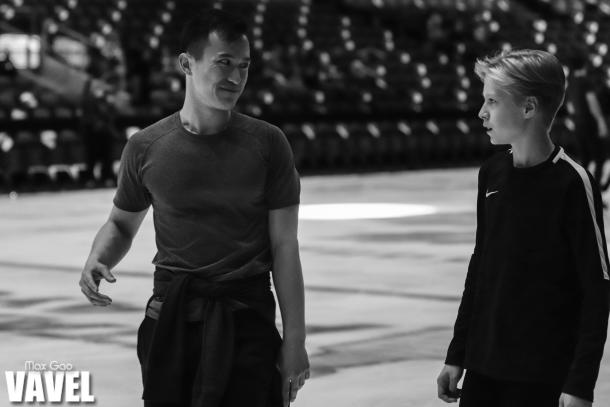
P: Well, I’ll tell you right now… Stephen is someone to look out for. Beyond the skating — I’m not even going to talk about his skating or the jumps because it’s obvious that he’s really talented — I think it’s more so his demeanour and the way he carries himself. You can tell he’s a very focused, self-determined and self-driving athlete, so that’s key, I think, for someone to last and to have a long and successful career.
M: Well, it’s absolutely crazy when you think about it because Stephen is only 14, and now that you’re trying to remember that time as a 28-year-old, you’re almost asking yourself, ‘Where did all of that time go? I was his age when he was born!’
P: Yeah, right (laughs). It is crazy and the thing is that I don’t think a sport has ever changed this much in terms of genetics because physically, the athletes that are competing in skating now, it’s completely changed. You don’t see many skaters built like myself or like Elvis or like Brian [Orser] — more muscular men. Now, it’s almost become more like gymnastics. They’re getting younger and younger, they’re getting slimmer and slimmer. It’s not about how high you jump; it’s about how fast you rotate. It’s a big change in the physical scope of skating. So, it’s hard to predict what it’s going to be like.
But one thing’s for sure: We’re seeing a lot of young, young skaters at 15 or 16 years old doing more quads than I’ve ever done, but one undeniable question is: How can you maintain it? What is the in-between for each of those skaters? Are we starting to veer too far [from the artistry of figure skating]? I see it with coaching kids now: A lot of coaches want to push their students to jump earlier and earlier to catch up to these young guys doing quads, but then they’re forgetting a lot of basics. I teach a lot of kids who can do single and double jumps, but they can’t even hold a basic position like inside edge. It’s like they have no sense of edges, which is, I think, very frightening. It’s such a shame, too, because that’s what makes me enjoy skating even more now. It’s the control of edges — I much more appreciate it now — and to lose that would be a big shame.
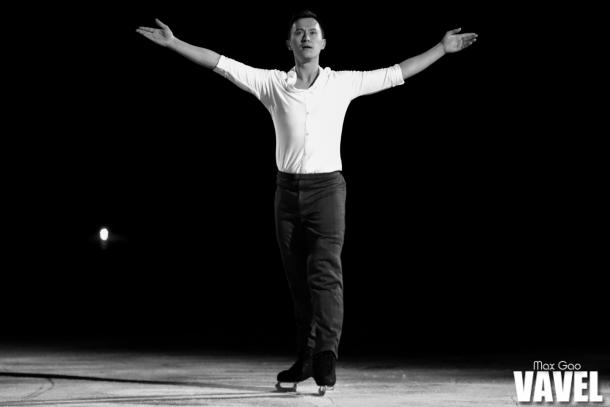
M: Absolutely! It would be a huge shame. Now looking back on your career, you’ve managed to inspire so many people. You’ve actually inspired me quite a bit because I remember when I was little, I would watch a lot of sports on TV, but I never really saw anyone who looked like me and that I could easily relate to. That’s part of the reason why you actually became one of my favourite athletes growing up.
P: Wow, thank you.
M: Well, no, thank you! Things have definitely changed since then, and now we have a lot of Asian Americans who are actually trying to break through in sports right now, but we haven’t really had many who have done so yet. I think you’re one of the few Asian Canadians who has been able to do so, so what do you think can be done to encourage little boys and girls, particularly those of Asian descent, to get into a sport like figure skating, or even just sports in general? It’s very difficult for people like us sometimes because truthfully, we are built differently and we aren’t always built to succeed in sports.
P: For sure, for sure. We look differently, too. I mean, I think I always believed that you should look inwards as opposed to outwards, to care less about what people think and the norm and what people think things are supposed to look like or how an athlete is supposed to look or act.
I was a pretty awkward kid. When I was younger, I look back at pictures of myself when I was competing at 18, 19, and I’m just like, ‘Oooh, he needs a better haircut!’ (laughs). I don’t know… I was an awkward kid, too, and that’s normal. But you know what? My friends and the people I grew up with, like Eric [Radford], Jeff, Andrew [Poje], Scott and Tessa, [they really helped me]…
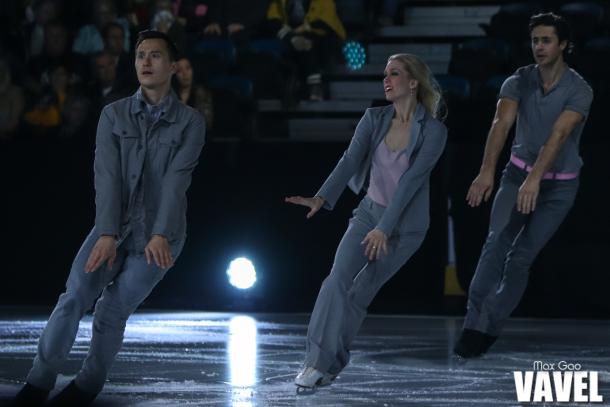
Scott was a huge part of just the community and helping me be who I am and be my own personality and not be so shy to be from an immigrant family. They really helped me feel included because when you’re in sport, I think sport transcends race and gender.
I think [for those who feel different], just look inwardly and if you’re determined and if you have the dedication and the desire to do it and to actually push yourself to do it, that’s all you’ll need. The rest will work out (smiles). How you look, how you are stylized and how you physically look… that doesn’t really matter as long as you get it done.
Look at Nathan Chen in the U.S… I think he’s a great representative of Chinese-American and Chinese-North-American athletes because he’s an extremely talented athlete — explosive, very slender and he’s just, like, a cool guy, man! (smiles). He’s going to Yale and is a smart kid, really well-versed with a good personality so yeah, I don’t know.
Don’t feel discouraged by [thoughts like]: ‘Oh, I don’t look like a normal figure skater or whatever.’ I think we’re entering a time when it doesn’t matter; it’s more so about what kind of results you can produce.
M: That’s so well said. Speaking of some of the skaters that you grew up with, Tessa did an interview not too long ago where she ended up implying that she doesn’t necessarily see herself as being someone like Elvis who is touring into his forties. She’s someone who feels like if she can’t perform at the highest level anymore, then that is when she feels she should stop. Do you feel the same way?
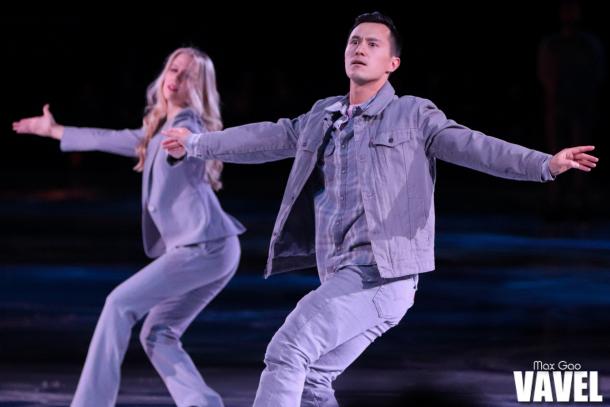
P: Yes and no. I actually had a really bad skiing accident in December; I tore two ligaments in my knee and that was a big wake-up call. You take your body for granted as a skater, and I did before the accident, but it was just like, ‘Holy crap.’ It’s life-changing, you know? I definitely feel older in a way because I feel limited now… I have second thoughts and doubts now.
Physically, how my being is a big part [of that decision that I will have to make] but I think it’s more my mentality and my psychological outlook of skating — I think that’s going to be the first determinator of how the rest of my skating career is going to look like, more than my physical. I’m still fairly quite young.
Of course, I don’t see myself skating at however old they are, 40, close to 50 — Kurt is over 50. But you have to respect them because they came from an era where skating will never go back to that kind of era, so they’re very unique, like special cases. Stephen’s already replacing me in terms of the competitive Canadian scene and it’s only a matter of time until he does the same on the professional side, right? (smiles).
M: I guess so… Does that mean that you think that you’ll just reach a certain point in the near future where you will feel like it’s time to stop?
P: I feel it, yeah. I think when the next [Winter] Olympics come, so 2022, when that date arrives… that’s kind of my mark right now. I should be making a big decision by then, if not before, about the continuation of my skating career.
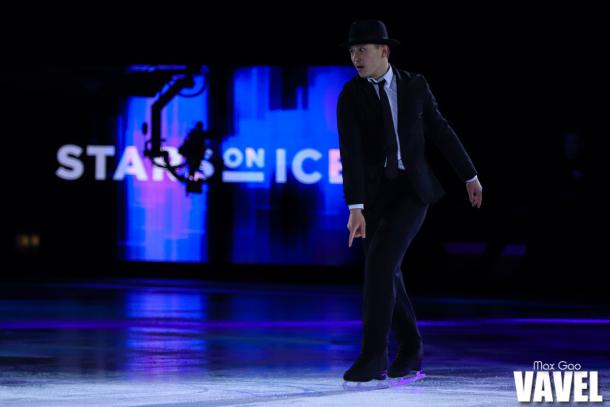
M: Finally, I know you briefly mentioned some things but what goals do you have for the foreseeable future or are they a little up in the air right now?
P: It’s very much up in the air, but I do want to get more involved with the community in Vancouver and B.C., most likely through skating. Skating is actually quite weak on the West coast; it’s very strong and there are a lot of schools on the East coast. My dream would be to be part of the development of West coast Canadian skating.
Yeah, [and] maybe [working to save] the environment. I know, super random! But living in Vancouver, I’ve witnessed the forest fires that we’ve had and it’s so sad just to see some of the beautiful landscapes in this country and to see it all burn away because of global warming. It’s no joke. There’s more storms, there’s flooding everywhere, there’s bigger storms at more random times… I think our generation should be really doing more, or even the older generations, like our parents, need to be more aware of that because it’s pretty scary. It’s beyond sport. If we destroy the home that we live in and the planet that we live on, it’s like, ‘Goodbye, sports!’ It’s beyond that, so I’ve really truly become much more aware of the impact we have on the environment. I find myself thinking about it a lot more, but I don’t know how to combine skating and that (laughs).









































